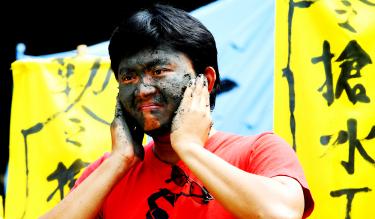Hundreds of farmers from Changhua County yesterday rallied outside the Executive Yuan in Taipei, urging the government to fulfill a pledge to stop the construction of an aqueduct that would divert water from crops to a science park.
“Stop the water robbery right now,” the 300 farmers — mostly from Changhua County’s Sijhou Township (溪州) — and their supporters shouted in anger.
Yesterday was the 12th time the farmers had traveled to Taipei to call on the government to keep its promise to stop the construction of the aqueduct, which would divert water from Cizaipijun (莿仔埤圳), the major irrigation system in southern Changhua County, to the Central Taiwan Science Park’s (CTSP) Erlin Township (二林) campus.
The National Science Council first said on March 8 that it would order a halt to the construction because the Erlin campus project was not proceeding as planned, and the next day, National Science Council Minister Cyrus Chu (朱敬一) officially informed the legislature of the decision.
On March 12, CTSP director-general Yang Wen-ke (楊文科) told the legislature that construction had been halted, and that the work going on at the construction site was intended to restore the site and would be completed within three days — but construction continued.
Accompanying lawmakers on a recent trip to southern Changhua, National Science Council deputy director-general Hocheng Hong (賀陳弘) promised in front of legislators and about 1,000 farmers who demonstrated along the way that construction would be halted.
However, despite all the talk and the promises construction work still went ahead.
Questioned by the media, Yang said he was not aware that the construction was continuing, but an attorney representing the CTSP administration said in court that the construction could not be stopped just because of what the minister said, because there was a legally binding contract between the construction firm and CTSP.
Unable to stop the construction, Chu took the issue to the Executive Yuan, asking Premier Sean Chen (陳?) to make a decision to stop the construction.
However, Chen has yet to make a decision and the aqueduct construction restarted earlier this month.
“The CTSP should not take the water, this is benefiting a few at the expense of the majority,” Sijhou farmer Cheng Sen-yi (鄭森益) told the crowd yesterday. “This is nonsense. This is a nonsense government exploiting farmers.”
“The council already said the CTSP’s Erlin project is not going well, so why is the Executive Yuan taking so long to decide to stop construction?” asked Wu Yin-ning (吳音寧), chief secretary at the Sijhou Township Office and a writer.
The faces of the young activists and the mostly elderly farmers were smeared with mud from Jhuoshuei River (濁水溪), a major water source in the Changhua area. They said it symbolized the river water and the mud that have accompanied their growth and ageing, in contrast to the “water-jacking” project that would deprive them of their livelihoods.
Unable to see Executive Yuan officials, the farmers decided to stage a sit-in protest until officials came out to talk.
The rally ended at about 5pm after Minister-without-Portfolio Simon Chang (張善政) received their written appeal.
However, Chang did not respond to their request on the spot. He promised the protesters he would convene an inter-governmental meeting to discuss the issues and reply to their appeal within a week.
Source: Taipei Times - 2012/04/13





















